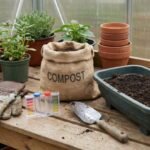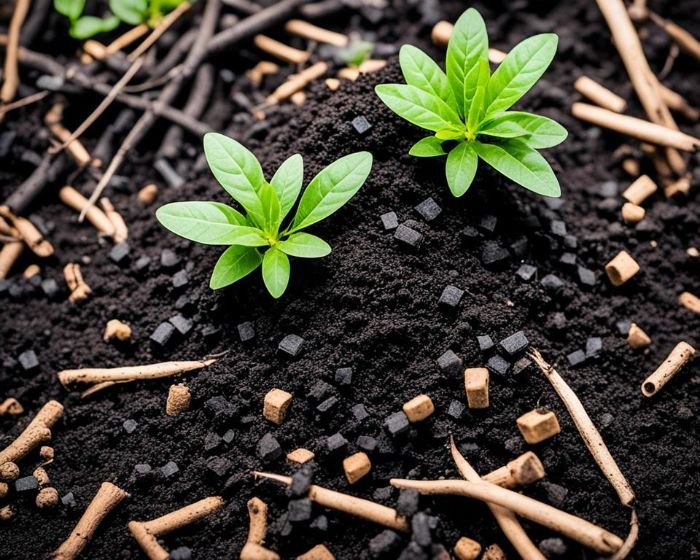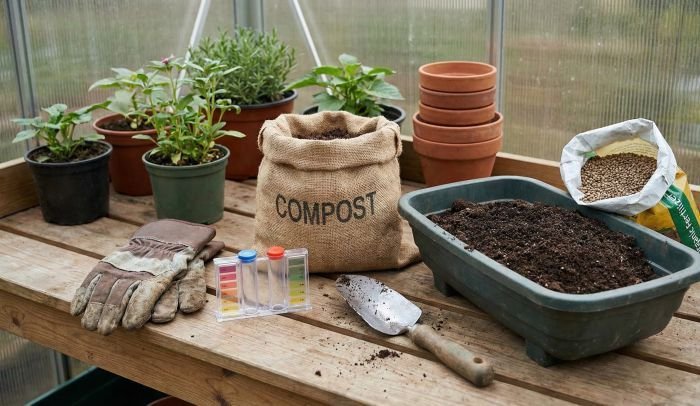Could this ancient agricultural practice be the key to sustainable farming today?
Facing the challenge of keeping soils productive, biochar shows promise. It comes from burning organic materials in a special way. This makes it rich in carbon and great for the soil. Biochar has a long history, known in the Amazon as a soil booster. It helps keep soils fertile and captures carbon from the air, helping the climate.
Key Takeaways
- Biochar is a sustainable agriculture solution, derived from pyrolyzing organic matter.
- Enhances soil health by improving structure, nutrient retention, and microbial activity.
- Effectively reduces environmental impact and promotes resource efficiency.
- Plays a significant role in carbon sequestration, contributing to climate change mitigation.
- Historically rooted in the fertile soils of the Amazonian terra preta, showcasing its long-term benefits.
Table of Contents
Introduction to Biochar
Biochar is an amazing addition to farming for two big reasons. It helps soil health and takes carbon out of the air. Farmers use it to make their soil better for plants. Plus, it’s good for the environment. This material is made from heating things like wood in a special way. It’s part of how nature recycles stuff.
What is Biochar?
Biochar is like a super sponge that plants love. It comes from heating up things like wood in special conditions. This makes it great at holding onto things like water and nutrients. That means it makes soil a better place for plants to grow. The things used to make biochar can be stuff like what’s left over from plants or even animal waste.
Historical Use of Biochar
In places like the Amazon Basin, people have used biochar for a long time. They mixed charcoal with waste and made great soil. This special soil, called terra preta, is still really good for growing plants. Even after many years. That shows how special biochar is for making soil better, even today.
Benefits of Biochar as a Soil Amendment
Biochar is a key player in improving soil for farming sustainably. It boosts soil quality and improves farming success.
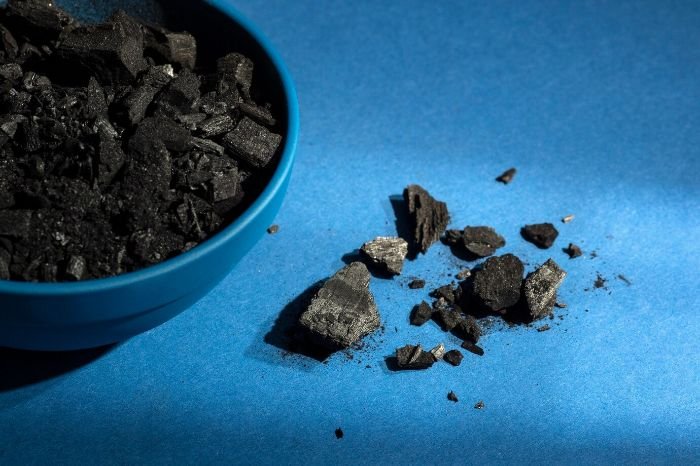
Improving Soil Structure
Biochar can make soil better, especially sandy soil. It makes soil looser and lets water in but reduces how heavy it is. This helps plants grow stronger and enriches the earth.
Enhancing Nutrient Retention
Biochar’s tiny holes keep nutrients from leaving the soil. This means the earth stays rich, helping farms in the long run.
Increasing Water Holding Capacity
Biochar helps soil hold more water. This is great, especially where it doesn’t rain much. Plants get a better water supply, making them tough and productive.
Promoting Soil Microbial Activity
Using biochar in soil gets the tiny life forms working hard. They help the earth by turning dead stuff into plant food. This makes the soil rich and ideal for farming without harming the environment.
How Biochar Works in the Soil
Biochar enhances soil through its special physical and chemical properties. These qualities help the soil become healthier and more fertile.
Biochar’s Physical Properties
Biochar has a big surface area and lots of tiny holes. This makes soil have more air and hold water better. As a result, it can catch more nutrients and water, which is great for plants.
Chemical Interactions in the Soil
On a chemical level, biochar does a lot in the soil. It sticks to harmful things and helps clean the soil. Plus, it can make the soil less acidic and balance nutrient levels better. This all boosts how well plants can grow.
Methods of Producing Biochar
Biochar production has come a long way, from ancient techniques to today’s advanced, controlled methods. This change leads to more efficiency and better quality. It focuses on using different organic materials wisely.
Traditional Techniques
Ancient biochar-making ways include pit and mound pyrolysis. They were used for hundreds of years. People back then would cover organic materials in earth pits or mounds and burn them slow, without much oxygen. This way, they made biochar from wood and leftover crops. However, the heat wasn’t easy to control. So, the biochar’s quality varied.
Modern Production Methods
Now, thanks to new tech, making biochar has improved a lot. Modern methods, like slow pyrolysis in special machines, give better control over temperature. This results in more quality and consistent biochar. There’s also a method using microwaves that’s being explored. It aims to make biochar production even better for the environment and farming.
Applying Biochar to Your Garden
Adding biochar to your garden boosts its health in effective steps. First, you prepare and activate the biochar. Then, you pick the best amount to use for your garden. Each step is key to making your garden soil better.
Preparation and Activation of Biochar
Getting biochar ready is important. You mix it with nutrients or compost to make it work better with the soil. This step ensures it helps your plants grow strong.
Optimal Application Rates
It’s crucial to figure out how much biochar your garden needs. This amount depends on your soil and goals for the garden. Follow expert tips to get top results.
Mixing Biochar with Compost and Other Amendments
Using biochar with compost and more helps your garden immensely. This mix boosts nutrients and makes the soil better for plants. It also helps the soil’s living organisms thrive.
Biochar and Sustainability
Biochar helps in making agriculture more sustainable. It does this by fighting climate change, reducing waste, and keeping soil healthy for a long time. This method is a step towards caring for our environment better.
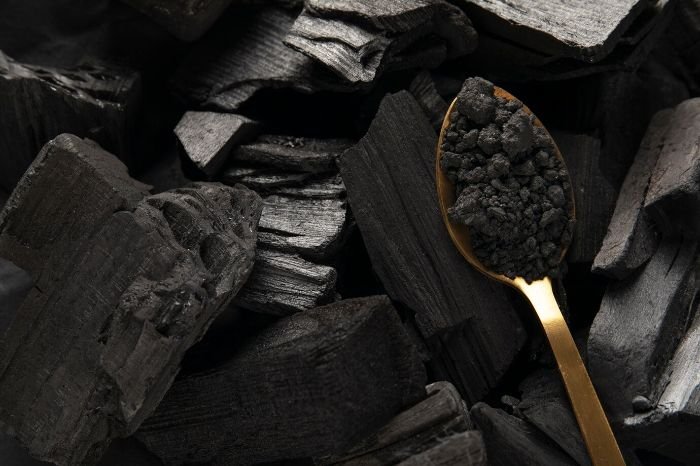
Carbon Sequestration
Biochar is good at grabbing carbon from the air and holding it in the ground. This keeps carbon out of the air, helping to slow down climate change. Essentially, it locks up carbon in a safe place.
Reducing Agricultural Waste
In farming, biochar turns leftover plant parts into something useful. By doing this, it changes possible trash into a health booster for soil. Farmers can then manage waste in a way that’s kind to the earth.
Enhancing Soil Health for Future Generations
Choosing biochar means looking after our soil for the future. It makes the ground more able to grow crops by improving its structure and how it holds water and nutrients. This is a big step for making sure farming stays sustainable in the long run.
Practical Tips for Home Gardeners
Using biochar in your garden helps the environment and makes soil better. Here are easy tips to start.
Sourcing Quality Biochar
Getting good biochar is key for your garden. Choose one that fits how you work with your soil. Pick ones that are certified to do well for the Earth and your plants.
DIY Biochar Production
Love doing things yourself? Making biochar at home can be fun and helpful. You can use wood chips and leftover farming stuff. This makes a cheap and green way to improve your garden soil.
Monitoring and Adjusting Biochar Use
Using biochar needs watching and some tweaks. Check how your soil and plants are doing. Changing how you use biochar can really boost your garden’s health long-term.
Common Misconceptions about Biochar
Despite its popularity, many misunderstandings about biochar still exist. These myths create confusion about its benefits and uses. Knowing the truth about biochar helps clear these up, making it more useful in farming and gardening.
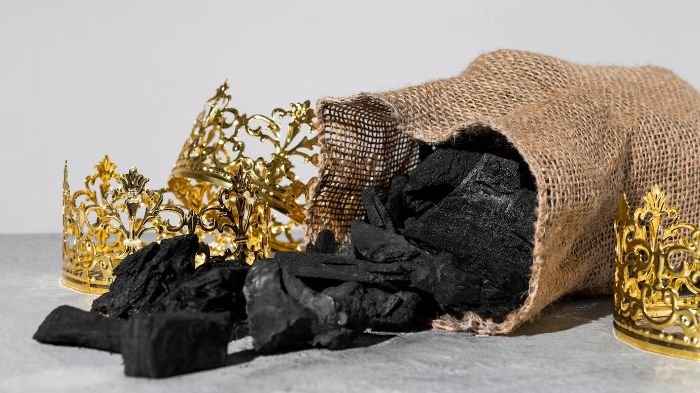
Myths vs. Facts
Some think biochar offers quick plant nutrients, but that’s not the case. It actually improves soil over time, acting as a soil conditioner. It can even help with acidic soils by adjusting the pH.
Addressing Concerns and Misunderstandings
There are worries about biochar’s impact on the environment. However, studies show it can make soil healthier by boosting microbial activity. This makes it a good addition to sustainable farming and caring for the environment.
Conclusion – The Future of Biochar in Gardening
Biochar is gaining a name as a key player in caring for our soil without harm. It’s an added layer to our soil that does wonders. It makes the soil better at holding water and nutrients. And it helps good microbes thrive. With biochar, farming and gardening can tackle big problems. It can help us grow more food without hurting the earth.
The future of biochar looks bright in gardens. It brings new, green ways to help plants grow strong. By improving the soil, biochar makes gardens tougher. They can take on tough times and still flourish. Plus, using biochar means using less harmful chemicals. That’s good news for the earth and the food we grow.
Biochar does more than just make soil better today. It’s a player in the fight against climate change for the long haul. It traps carbon in the ground, helping to cool off our planet. As more people use biochar, our farms and gardens will do even better. This helps us all by making sure we have enough food and a healthy planet
FAQ
What is Biochar?
Biochar is a stable, carbon-rich material. It comes from the pyrolysis of many organic materials. This can include leftover plants and animal waste. The pyrolysis process happens without much oxygen. This makes the end product very good at adsorbing things and is very porous.
How does biochar improve soil structure?
Biochar makes sandy soil better by holding it together. It makes the soil less tightly packed. This lets air and water move freely, helping plants grow.
How does biochar enhance nutrient retention?
Biochar’s full of tiny holes that can fit nutrients. This keeps the nutrients from washing away and makes them better for plants. It’s like a sponge for plant food.
How does biochar promote soil microbial activity?
Biochar’s pores are great homes for tiny soil friends. It helps them survive and stay healthy. This makes the soil ready for plants to grow well.
How does biochar chemically interact with soil?
Biochar pulls in bad stuff that might hurt plants, like a magnet. It also makes too-acidic soil just right. This means plants can get all the food they need.
What modern production methods are used for biochar?
Now we make biochar in special ovens and reactors. This way is more careful. It lets us control how biochar turns out, so it works the best.
Can biochar be mixed with compost and other amendments?
Yes, mixing biochar with compost is great. It boosts the food for plants and makes the soil work better. This is good for the earth.
How does biochar help reduce agricultural waste?
Making biochar turns trash into something good for the land. It helps the Earth by using up what would have been garbage. This keeps farming healthy for the future.
What should home gardeners consider when sourcing quality biochar?
It’s important to find good biochar for the soil. Make sure it’s safe and made for gardens. This means plants will grow well and the earth stays healthy.
How should biochar use be monitored and adjusted?
Keep an eye on how biochar helps the soil. Test the soil and watch the plants. This makes sure the ground is the best it can be for growing.
How can concerns and misunderstandings about biochar be addressed?
To clear up worries, talk about what biochar really does. Using the right amount won’t change soil too much. It does good things for the farm and the planet.
